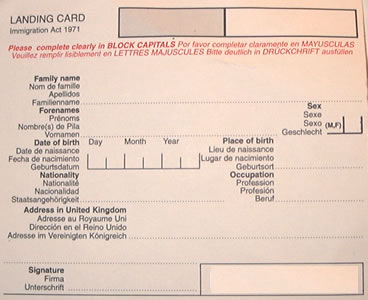United Kingdom Landing Card
By entering your email, you are signing up to receive emails about new products & special offers from Henri Bendel. Henri Bendel 712 Fifth Avenue New York, NY, 10019. My question is as follows: Most non EU nationals need to submit a landing card to a UK Immigration officer upon arrival in the UK. You will need to specify on how long you will stay and your contact information.

This Order, revoking and replacing the Immigration (Landing and Embarkation Cards) Order 1972, extends the categories of persons required to produce landing or embarkation cards when disembarking or embarking in the United Kingdom. Jul 4, 2016 - Wikipedia gives the reason here. The Secretary of State may by order made by statutory instrument make provision for requiring passengers.
Arriving at the airport When you arrive at the airport, follow the signs for ‘Arrivals’ unless you are transferring to another plane at the same airport. If you are transferring to another flight, follow the ‘Flight connections’ signs. ‘Arrivals’ will take you to passport control. Here, electronic screens will show you where to go – there are usually separate queues for passengers who have passports from the UK, EEA (European Economic Area) or Switzerland, and for all other passport holders. Once you have completed the immigration process (see the UKCISA website for more details about immigration and customs), you'll proceed to the baggage reclaim area to collect your luggage. Look at the screens above the baggage carousels to find your flight number. Finally, you'll pass through Customs Control.
At UK airports there are normally three exits through Customs – a green channel if you are travelling from outside the EEA and have nothing to declare; a red channel if you are travelling from outside the EEA and have goods to declare; and a blue channel if you've arrived from another airport within the EEA. Follow the links below to check what items should be declared. Border Force (part of the UK government’s Home Office) is responsible for immigration and customs checks at airports. These are Border Force's top tips for a smooth journey: DELETE? Have your passport ready. • Ensure you complete a landing card if you’re a non-EEA (European Economic Area) national.
Landing cards are sometimes given out on the plane, or you can find them in the immigration hall. • Bring details of your course of study. If you have a Confirmation of Acceptance for Studies (CAS) number, bring proof of this too. • Keep any medical documentation, recent bank statements and details of where you are staying in your hand luggage. You may be asked to show this information.
• Do not bring any meat or dairy products from outside the European Union. There are also restrictions on other food products such as fish, eggs and honey, as well as some fruit, vegetables and plants (e.g. Bulbs, seeds, cut flowers and tree bark). Find out more • There are restrictions on the amount of tobacco, alcohol and gifts you can bring to the UK. Find out more • Be aware of your duty free limit. If you exceed your allowance, you will have to declare it and pay duty at customs (go through the ‘red channel’), otherwise all of your items may be taken away from you.
United Kingdom Landing Card
• Never bring in counterfeit goods, illegal drugs, weapons or obscene material. Some items are restricted and will require a licence or permit.
Us Landing Card
Find out more • You must declare any sums of cash of €10,000 or more (or the equivalent in another currency), if you are travelling from a country outside the European Union. • Never give false or misleading information (including forged or counterfeit documents). Students from Australia, Canada, Japan, New Zealand and the USA If you're coming to the UK from any of these five countries on a Tier 4 visa or a Standard Visitor Visa (previously an Academic Visitor Visa), you can sign up for the official Registered Traveller service.





